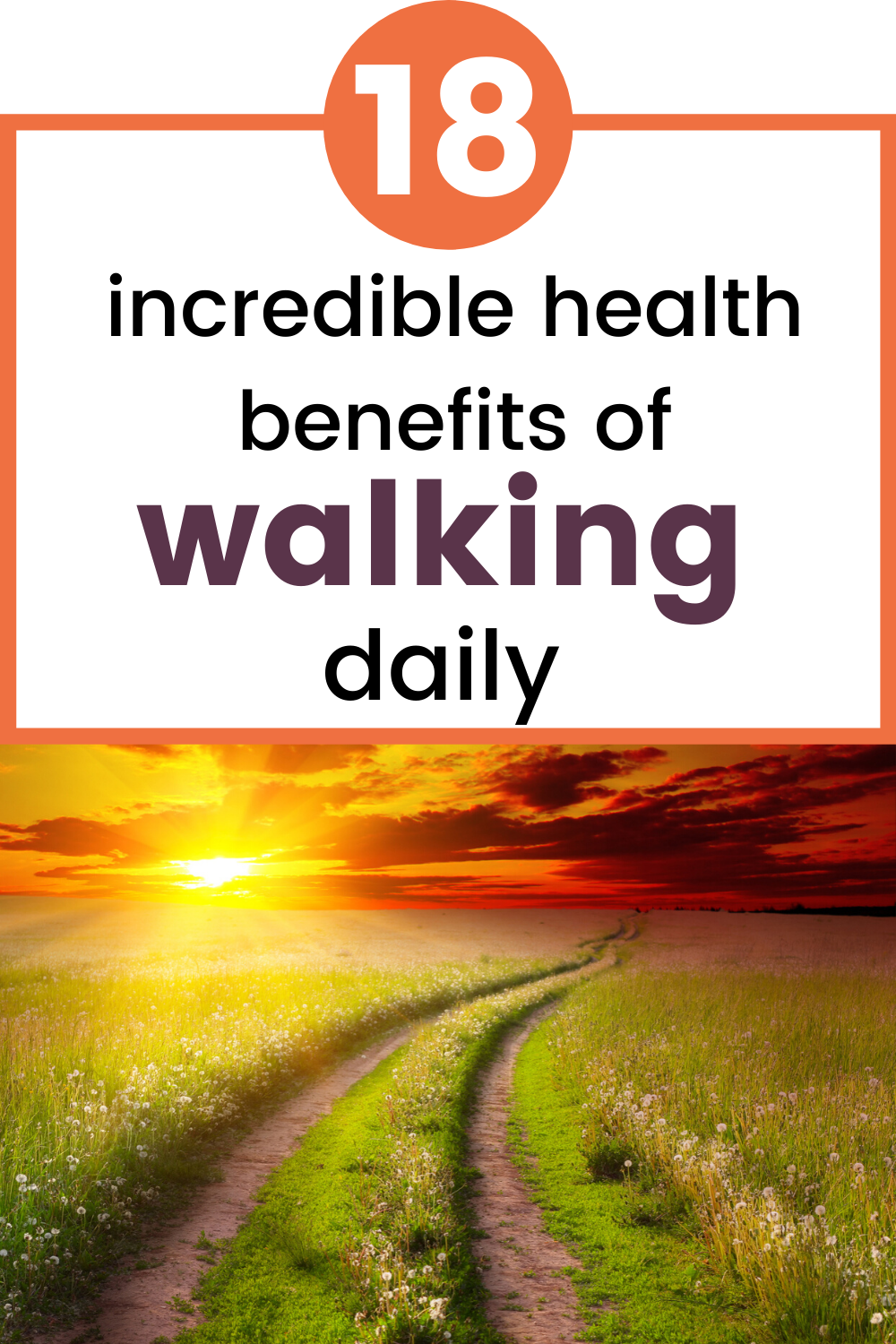
Me thinks that the moment my legs begin to move, my thoughts begin to flow. Henry David Thoreau
If you’re able to trim your waistline, then you are going to be able to improve your health.
It’s a common thing that doctors are saying more and more these days. In the US, about 2 in every 3 adults is at least overweight.
Yet many are finding it difficult to improve their health due to the demands of their jobs, their family responsibilities, and everything else that goes on in modern life.
One of the best exercises you can do to improve your health is to go take a walk.
“Walking doesn’t get the respect it deserves, either for its health benefits, its value for transportation, or its role in recreation.”
The health benefits of walking daily depend on three factors: intensity, duration, and frequency.
So if you’re looking to follow your doctor’s advice to improve your health, then walking could be the perfect solution.
Not only can it trim your waistline, you’ll find that it may be able to provide you with these additional benefits.
#1. Walking can help to improve blood circulation.
Any exercise for the heart is a good thing. If you can walk just 1-2 miles per day, you can lower your blood pressure by 10+ points in 6 months or less.
Those who walk every day also have improved blood circulation, strengthened hearts, and more consistent pulse rates.
Women who walk 30 minutes per day are able to reduce their risks of having a stroke by at least 20%. Brisk walking may reduce the stroke risk by up to 40%.
The American Diabetes Association says that chronic disease risks can also be reduced with regular walking and better blood circulation.
Your blood sugar levels are lowered with regular walking, which lowers the risks of diabetes development.
In 2002, the New England Journal of Medicine published a study which showed that 30 minutes of walking briskly, 5 days per week, was enough to lower the risks of cardiovascular disease by up to 30%.
The circulatory benefits of walking on a regular basis have been thoroughly documented over the years.
Walking daily can provide some impressive results if you’re willing to get yourself moving.
#2. Walking inspires creativity.
Exercise does more than help you fit into your clothes a little better.
It can also help your creativity get a recharge.
When individuals are struggling to focus on a specific task, taking a walk of 15-30 minutes can help them to regain that focus.
A 2014 study in the Journal of EP, Learning, Memory, and Cognition, published by researchers at Stanford, showed that when people take a walk when facing a difficult problem, they are able to think more creatively than those who have not gone for a walk to find a solution.
The results were clear. 100% of those who had walked were able to generate at least one novel analogy.
Only half of those who were seated inside were able to do the same.
The study also found that the environment was not a factor in sparking creativity. Indoor or outdoor walking boosted creativity in similar ways.
#3. Walking can improve your mood almost immediately.

Taking a daily walk provide similar mood stabilization results to daily mediation.
If you don’t feel like putting in 20-30 minutes of meditation every day, then consider 20-30 minutes of walking instead.
Walking for mood stabilization does more than just take the edge off of a bad day.
It can also reduce your overall feelings of anger. It has a powerful effect on feelings of worry or anxiety.
If you’re able to walk with a friend 2-3 times per week, then the social interaction also helps you to feel more connected to the world.
This boosts the positive feelings that walking can provide, reinforcing the overall benefits even more.
Walking outdoors in the winter months for those in the northern or southern latitudes can also help to prevent certain mood disorders, such as Seasonal Affective Disorder, because there is added exposure to sunshine.
#4. Walking can reduce the risks of varicose vein development.
If you’re in your teens or 20s, then this benefit might not seem like an important one. If you’re in your 30s or older, however, you will want to take note.
According to Dr. Luis Navarro, who is the Director of The Vein Treatment Center in New York City, walking is a proven way to reduce the appearance of varicose veins.
It can be difficult to start walking when the legs feel heavy and achy due to the formation of varicose veins.
Any walking that can be accomplished will improve them, especially if the exercise can be repeated on a daily basis.
Proactively walking when younger can help to prevent their formation in the first place.
Those who have a family history of varicose veins should consider 15-30 minutes of brisk walking on a daily basis right away.
Walking can also help spider veins which can form close to the skin’s surface.
If you do have varicose veins, then try to wear compression stockings or spend 20-30 minutes elevating your legs before having a walking session.
#5. Walking acts like coffee for your digestive system.
You wake up in the morning. You make yourself a cup of coffee (or stop by your favorite coffee shop). Sure enough, you’re ready to hit the bathroom for your morning appointment.
A regular walking routine helps to improve digestive mobility in the same way, but without a stimulant to the system.
It is so effective, in fact, that many surgeons prescribe walking as part of the recovery treatment plan for abdominal surgery patients.
This is because the process of walking engages the core muscle group, which helps to regulate the digestive system.
A brisk 10 to 20-minute walk after a meal or before bedtime is all that is necessary to take advantage of this benefit.
If you have eaten a larger meal than normal, you may wish to wait for up to an hour after eating to avoid cramping.
For difficult cases of constipation or irregularity, combining walking with Yoga on a regular basis can help your digestive system as well.
That doesn’t mean you need to give up your daily cup of coffee.
It just means you’re changing the purpose of why you’re having that coffee every morning.
#6. Walking can improve your self-confidence.
Regular walking does more than help you achieve your fitness goals. It can also boost your confidence.
Self-confidence generally forms and strengthens when there are positive routines sprinkled throughout the day.
When you believe that walking, as part of your daily routine, can help you take control of your life, then it will encourage you to take on more healthy habits.
This means being able to establish a walking habit is an important step.
If you’re struggling to find the time to take a daily walk, then work on making 15 minutes for a walk every day for a week.
Then use a pedometer after that week to track the number of steps you are able to take during that 15-minute walk.
Write down the number of steps you’re able to take during that time period.
Create the goal of improving that number by 100 steps over the course of the next week.
So if you’re able to walk 1,000 steps during the first week of tracking, your goal should be to walk 1,100 steps over the course of the next week.
The final goal should be to walk 2,000 steps during a 15-minute walk.
If you can meet this goal, then the feelings of success will lead to more confidence.
If you see progress toward this goal, the feelings of success will also lead to more confidence.
It’s a win/win opportunity.
#7. Walking can help you to live longer.

Any walking can help you be able to live longer than someone who does not walk on a regular basis.
There is also evidence linking the intensity of your walking to even lesser risks of mortality.
In a research study conducted by the Centers for Disease Control, subjects wore accelerometers for 7 days.
Each individual was between the ages of 50-79. Researchers found that the least active people from this study period were 5 times more likely to die than those who were most active.
People who had activity levels between the most active and least active groups were only three times more likely to die than those who were most active.
The results prove that adding just 10 minutes of light walking per day could make a large difference in the risks of a premature death.
Research out of the University of Michigan and the Veteran’s Administration in Ann Arbor helps to confirm these results.
It was found that those who exercise regularly once they reach the age of 50 are 35% less likely to pass away unexpectedly over the next 8 years compared to those who do not walk regularly.
The risk reduction improves to 45% when there are underlying health conditions.
#8. Walking reduces stress levels, even if cortisol levels are not reduced.
Ever notice that a stressful situation gets better if you start to do something?
Whether you’re doing chores around the house or taking a long walk, the exercise can help to reduce the feelings of stress that you are feeling.
Walking in a natural setting improves the stress reduction benefits that exercise can provide.
Taking a walk along the beach is a better experience than washing your windows, but both can help.
Walking is an effective way to lower cortisol levels.
Yet even when cortisol levels or other stress biomarkers are not reduced from the exercise, the feelings of stress reduction can still occur.
This means walking can reduce your stress, even if your body isn’t prepared to accept that fact right away.
The constant struggles against stress can lead to serious health consequences if it is allowed to remain unmanaged.
Stress is linked to high blood pressure, heart disease, depression, diabetes, and obesity.
#9. Walking can boost the functioning of your immune system.
If you’re feeling like you tend to always be a little sick, then summon up the energy to take a walk.
Just a simple 30-minute walk each day is enough to boost the immune system markers that are within your blood.
There is a notable increase in the number of T-cells which are produced when walking becomes a regular habit.
The amount of walking that you are able to do also has an impact on immune function.
In a research study conducted by the National Institutes of Health, it was found that individuals with a higher daily step count had better overall immunity compared to those with low or no step counts.
The study found that a physical activity level of about 7,000 steps per day “might be regarded as a moderate daily physical activity target” to improve immune function.
Where you walk may also matter.
Japanese research shows that when individuals take a walk where there is a high level of phytoncides, a chemical produced by plants to protect themselves from insects or rot, then there is an additional immune system boost.
What is notable about this research is that the immune system response is particularly strong with phytoncide exposure in a way that helps the human body be able to combat various cancers.
#10. Walking improves personal strength and balance.
Any walking will benefit you in several different ways.
If you’re brave enough to walk on natural surfaces, then the uneven nature of that walking can improve personal strength and balance.
This is particularly beneficial for those in the 65+ age demographic, who are most likely to experience a fall.
Several walking programs and research studies have shown that indoor walking or treadmill walking does not help to prevent falls.
This is because the muscle requirements for flat-surface or moving-surface walking is different than the muscle requirements for uneven natural ground.
It’s not your speed that matters to gain this health benefit of walking daily.
A slow and unsteady pace that allows you to safely navigate the natural surface works just fine.
In a 2010 study conducted by the National Institutes of Health, participants in a trail-walking exercise showed a decrease in the incidence of fall rates up to 12 months after the completion of the trial compared to indoor walking participants.
#11. Walking doesn’t cost anything to get started.
How much is it to join your local gym?
In the United States, the average monthly cost of a gym membership is $58.
According to Cheat Sheet, about $39 per month of this cost goes to waste because of under-utilization.
You could invest into a treadmill or elliptical machine to avoid that high monthly cost.
A reasonably good quality exercise machine will cost between $300-$500.
Yet to take advantage of the benefits of walking, you don’t even need to lace up a pair of shoes.
Just getting outside to walk, even if it’s in your backyard in your bare feet, is all it takes to begin taking advantage of all these many benefits.
Walking really can be free. You can really get started right now.
How many miles should you walk each day? It doesn’t really matter – especially at first.
It’s more about establishing the habit of walking.
Then you can focus on distance and intensity.
#12. Walking can improve your reaction time.
In a research study conducted with participants who were all 55 or older, individuals who exercised on a regular basis were compared to individuals who did not exercise at all or at least with regularity.
There were 62 people in each comparison group.
These groups were then given a one-hour series of tests on their cognitive skills at Scripps College in California.
Memory, reasoning, and reaction times were all tested.
The results showed that the group who exercised regularly performed significantly better in every category except for one memory test.
The most significant gains were in the reaction-time tests.
As people grow older, the risks of developing certain health conditions, such as osteoporosis, will continue to rise.
There may also be issues with arthritis, joint inflammation, and other problems that limit personal movement.
These issues create a negative cycle that continues to encourage a person’s physical health to decline.
The risks of many health issues rise when the amount of time a person stays sedentary rises.
Not only does walking improve reaction times, but it can also stall the increased risks in other categories based on an individual’s personal health.
As reported by American Trails, Dr. Michael Pratt, who works with the Centers for Disease Control in Atlanta, Georgia, the results of this research are quite surprising.
“I think what’s really notable is just how much of a benefit there is for older adults to be physically active,” he said. “We used to think that once you got to a certain age, it really didn’t make any difference anymore…”
#13. Walking can improve independence.
One of the biggest health benefits of walking daily, especially for older adults, is the level of independence it can provide.
Walking can even improve an individual’s ability to care for themselves on their own as they grow older.
Any walking will improve personal health.
For older adults who are able to walk 3+ miles per day, the benefits can be quite profound.
It can literally mean the difference between living a life that is long and fulfilling or preparing for the beginning of their eventual death.
Independence is more than just physically being able to care for oneself.
The social aspects of walking also apply and improve independence.
Even if you walk on your own instead of with a friend, the time spent allows people to get to know their neighborhoods better.
Now here’s the best part: it’s never too late to begin exercising.
You don’t have to be an athlete to be active.
All of the health benefits of walking 30 minutes a day, or less if necessary, can start accumulating at any age, young or old.
#14. Walking can help you lose weight.
If you take a brisk 30-minute walk, then the average number of calories burned from that effort is about 200.
When combined with changes to nutrition and overall eating habits, this can contribute to a healthy weight loss.
Most people should lose weight at 1-2 pounds per week so that the body is not overly stressed by the experience.
For those with liver or gall bladder health concerns, losing more weight per week can actually lead to serious health concerns.
It takes a total weekly reduction of 3,500 calories per week for the average person to lose 1 pound.
Walking briskly every day will take care of about 1,400 of those calories.
The rest is going to be up to you.
#15. Walking can improve the quality of your sleep.

Some people rely on a hot bath to get a good night of sleep.
Warm milk is a good trick from time to time. Professor Jim Horne says that getting a long walk could be a better solution.
When you take a walk somewhere that is enjoyable to you, then the aching feet and feelings of fatigue are not always because of exhaustion.
These activities can actually be beneficial to the circuitry of your brain.
It literally slows down the oscillations in the brain waves that are produced when sleeping.
Research has also shown that people who have slower oscillations while sleeping also tend to have faster thinking responses during the day.
Being exposed to daylight while walking can also reinforce the body’s internal clock, which allows a deeper, better sleep to occur each night.
The Fred Hutchinson Center in Seattle studied women aged 50-75 to determine if walking could provide better sleep patterns.
They found that those who were able to take a regular 1-hour walk every day were more likely to stop periods of insomnia compared to those who did not walk on a regular basis.
#16. Walking can reduce your personal risk of Alzheimer’s disease.
Not only can walking reduce your personal risk of developing Alzheimer’s disease, but researchers believe that this exercise can even slow the progression of it.
How many miles should you walk a day to take advantage of this benefit?
Researchers believe that walking 5 miles is enough to slow the progression of this disease, while healthy individuals should walk at least 6 miles to reduce their risk levels.
This is because walking is able to strengthen the memory circuits contained within the brain.
Not only does it protect against declines in memory loss, but researchers from the University Pittsburgh School of Medicine found that walking this distance each week will actually protect the very structure of the brain.
There is also potential evidence that walking even further each week can reduce your risks even more.
A study out of UC-San Francisco showed that women in the 65+ age demographic who walked 17.5 miles per week only had a 17% decline in memory over the study period compared to a 25% decline in memory for those who walked just 3.5 miles per week or less.
But any walking can help.
The University of Virginia Health System studied men between the ages of 71-93 in this area.
They found that men who walked just 0.25 miles or more per day had 50% fewer incidence of dementia or Alzheimer’s disease compared to those who walked less.
#17. Walking improves your health more than running.
Although any type of exercise can provide similar benefits to walking, the American Heart Association says that walking briskly can offer all of the same heart health factors as jogging can without the potential negative impact to the lower body.
It’s not an “all or nothing” proposition. Every step that you’re able to take will help to get you into better shape over time.
You can even split up 30 minutes of daily walking into two 15-minute walks to receive similar benefits.
Any time that you’re able to work in walking, even if it means shopping at the mall or taking your dog for a walk, you’re adding more steps that will help you over time.
Even if you’ve been sedentary for some time, it’s still not a problem.
Walking is easier to start than running, you can begin with just a few minutes per day, and the results are going to begin showing themselves pretty rapidly.
#18. Walking cures boredom.
Ever sat around at home, feeling bored because there was nothing on TV? Walking can cure that.
When you take a walk, you are interacting with the rest of the world.
Even if you don’t see anyone else during your walk, you’re outside breathing fresh air.
You’re taking in the sights and sounds of your neighborhood. You are experiencing life.
Walking is also considered to be a gateway activity for fitness for almost everyone.
Even runners or cyclists who are nursing an injury can stay in shape by incorporating walking as part of their physical therapy.
When you can make walking part of a long-term fitness routine, you will also one day feel the desire to try something that is more strenuous.
Then there is the fact that walking works to improve your emotional wellbeing and it is easy to see why Hippocrates said that “Walking is man’s best medicine.”
Are You Ready to Experience the Health Benefits of Walking Daily?
How many miles should I walk every day?
You could choose to take on the 10,000 steps challenge.
That’s about 5 miles every day. If you haven’t been walking for some time, then that might be more than you want to take on right now.
A better solution to start walking is to walk at your own pace for 15-30 minutes every day.
Consider breaking up those times if you prefer to make it even easier to include walking.
And if you’re finding it difficult to put in that much time, try taking a 5-minute walk around the block or down the street.
You can take a trip out to the local mall and window shop.
You can even park at the back of the parking lot when you run errands and that can incorporate some of the extra walking that will lead to these benefits.
The health benefits of walking daily have been researched and published for more than a century.
Now it’s your turn. Put one step in front of the other and these benefits can be yours starting today.
What benefits have you seen from walking on a regular basis? Do you have any tips to help someone start walking so they can experience these health benefits?
You may also be interested in:
1. How Often Should You Do Yoga to See Results?
3. Health Benefits of Deep Breathing
4. Health Benefits of Meditation






That’s a great article. Thanks so much for sharing this. I think most of us need to read this because we spend too much time sitting in front of the computer. I know I do too much. I can sit there for 10 hours straight just working on my online business. It’s crazy. I need to take small breaks in between and go for mini walks. Again, thanks for sharing.
I walk every day to work and I return from work on walking. Especially in the mornings it is a pleasure and it gives me inspiration along the way. And as you say in benefit number 3, it can improve your mood. Walking is just one form of feeling alive. In addition to that it stimulates your flow of thoughts and creativity.
And of course it has an effect on your weight. I noticed this when I was on vocations and I wouldn’t walk to work, I noticed that I gained a little weight, and not walking might have affected this
Walking is the easiest and the best exercise to do. I certainly believe that it improves blood circulation and that’s very beneficial. It also enhances my mood when I walk especially when I’m wearing my headphones and listening to music.
I wasn’t aware that it could help boost your immune system. That’s great. Improving my sleep and losing weight are at the top of the list.
But one thing I am curious about is why is walking more beneficial that running?
Outstanding post. Luke, Well done! And I do agree completely, walking is a great exercise. Personally I walk between 6000 and 15000 steps per day (thanks to Samsung). In my 50’s now and really thankful for my health. So I agree with all your points made completely. I also prefer walking above jogging or running. If you see me run, then follow me because something terribly is wrong then…lol!